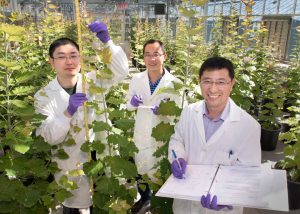Brookhaven National Laboratory is working on the challenge of converting lignin into biofuels and other bioproducts. A research team is looking at the possibility of engineering plants with less lignin. The idea is not new – other research teams have tried but their work resulted in weaker plants and stunted growth, reducing the plants ability to be used as a biomass feedstock.

Postdoctoral associate Yuanheng Cai, biological research associate Xuebin Zhang, and plant biochemist Chang-Jun Liu in the Brookhaven Lab greenhouse with transgenic trees designed to improve biofuel production.
However, led by Chang-Jun Liu, the lead author on the project, they have discovered a novel enzyme involved in lignin synthesis in aspen trees that increases access to biofuel building blocks without altering plant growth. Their research, published in Nature Communications, resulted in an almost 50 percent increase in ethanol yield from healthy aspen trees whose woody biomass released 62 percent more simple sugars than native plants.
“Our study provides a useful strategy for tailoring woody biomass for bio-based applications,” said Jun Liu who notes that lignin makes up about 20 percent of aspen’s woody structures, with cellulose and hemicellulose polymers making up approximately 45 and 25 percent, along with other minor components. “The lignin forms a barrier of sorts around the other polymers. Digestive enzymes can’t get through to break down the cellulose and hemicellulose to release their simple sugars.”
In this study, the scientists explored a creative new strategy for modifying lignin’s structure based on detailed analysis of enzyme structures that were previously solved by Liu’s group using x-rays. The scientists used biochemical analyses to identify a variant of monolignol 4-O-methyltransferase that had a slight chemical “preference” for reacting with one specific type of lignin precursor. The scientists reasoned that this variant had the potential to depress the formation of a particular lignin component.
To test this idea, they transplanted the gene for this variant into a strain of fast-growing aspen trees. The scientists then grew the altered aspen trees alongside untreated control trees in a greenhouse on Brookhaven’s property.
The trees that produced the engineered enzyme had slightly less total lignin in their cell walls. But on further analysis, the scientists found that these trees also had dramatically altered lignin structure, with a significant reduction in the level of one of the two major types of lignin components normally found in aspen trees.
“We expected that this condensed, more cross-linked lignin might make the plants even harder to digest, but found that wood containing these structures released up to 62 percent more simple sugars when treated with digestive enzymes,” Liu said. The yield of ethanol from this modified wood was almost 50 percent higher than the ethanol yield of wood derived from untreated control trees.
Interestingly, by imaging aspen wood samples using infrared light at NSLS, the scientists found that their approach for altering lignin content and composition also increased the production of cellulose fibers, the major source of fermentable sugars in the cell wall. This increased cellulose content might partially contribute to the increased release of simple sugars according to the research team.
“These data suggest that lignin condensation itself is not a critical factor affecting the digestibility of the cell wall,” said Liu. “The findings also support the idea that engineering the enzymes that modify lignin precursors represents a useful biotechnological solution for effectively tailoring the digestibility of poplar-family woody biomass to generate feedstocks for biofuel production.”

